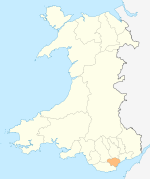Welsh Government
|
Logo of the Welsh Government | |
| Government overview | |
|---|---|
| Formed | 1999 |
| Jurisdiction | Wales |
| Headquarters | Crown Buildings, Cathays Park, Cardiff |
| Employees | 5,500 |
| Annual budget | £14.9 billion (2013/14) |
| Minister responsible |
The Rt Hon. Carwyn Jones, AM, First Minister |
| Government executive | Sir Derek Jones, KCB, Permanent Secretary |
| Website | www.gov.wales |
The Welsh Government (Welsh: Llywodraeth Cymru) is the executive branch of the devolved government in Wales. It is accountable to the National Assembly for Wales, the legislature which represents the interests of the Welsh people and makes laws for Wales. The National Assembly was created by the Government of Wales Act 1998.
The Welsh Government and the National Assembly for Wales were established as separate institutions under the Government of Wales Act 2006. The Government is referred to in that Act as the Welsh Assembly Government, but to prevent confusion about the respective roles and responsibilities of the National Assembly and the Government, the devolved administration became known as the Welsh Government in May 2011,[1] following the precedent set by the renaming of the Scottish Government in 2007. The new name was formalised in law in the Wales Act 2014.
The Welsh Government consists of the First Minister, usually the leader of the largest party in the National Assembly for Wales; up to twelve ministers and deputy ministers, appointed by the First Minister; and a Counsel General, nominated by the First Minister and approved by the National Assembly.
The current First Minister is Carwyn Jones, formally appointed by the Queen on 12 May 2011, who appointed ten ministers and deputy ministers. The Counsel General is Theodore Huckle QC.
1999 to 2007 (Executive Committee of the National Assembly)
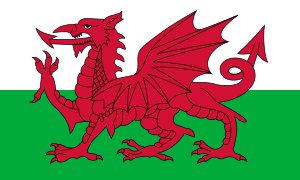 |
| This article is part of a series on the politics and government of Wales |
|
Law and justice |
|
Wales in the EU |
|
Administrative divisions |
|
British politics portal |
As initially established, the Welsh Government had no independent executive powers in law (unlike, for instance, the Scottish Ministers and Ministers in the UK Government). The National Assembly was established as a body corporate by the Government of Wales Act 1998 and the executive, as a committee of the Assembly, only had those powers that the Assembly as a whole voted to delegate to Ministers.
The Government of Wales Act 2006 formally separated the legislature (National Assembly for Wales) and the Welsh Government, giving Welsh Ministers independent executive authority, this taking effect after the May 2007 elections. Following separation, the Welsh Ministers exercise functions in their own right. Further transfers of executive functions from the UK Government can be made directly to the Welsh Ministers (with their consent) by an Order in Council approved by UK Parliament.
Separation was designed to clarify the respective roles of the legislature and the executive. Under the structures established by the Government of Wales Act 2006, the role of Welsh Ministers is to make decisions; develop and implement policy; exercise executive functions and make statutory instruments. The 60 Assembly Members in the National Assembly scrutinise the Government’s decisions and policies; hold Ministers to account; approve budgets for the Welsh Government’s programmes; and enact Assembly Acts on subjects within devolved legislative competence.
The result mirrored much more closely the relationship between the UK Government and UK Parliament and that between the Scottish Government and the Scottish Parliament.
After the 2007 election of the National Assembly for Wales
Legal separation
The new arrangements provided for in the Government of Wales Act 2006 created a formal legal separation between the National Assembly for Wales, the legislature comprising the 60 Assembly members, and the Welsh Government, the executive, comprising the First Minister, Welsh Ministers, Deputy Welsh Ministers and the Counsel General. This separation between legislature and executive took effect on the appointment of the First Minister by Her Majesty the Queen following the Assembly election on 3 May 2007.
Separation should help to clarify the respective roles of the legislature and the executive. The role of the executive is now to make decisions; develop and implement policy; exercise executive functions and make statutory instruments. The 60 Assembly members in the National Assembly scrutinise the Welsh Government’s decisions and policies; hold Ministers to account; approve budgets for the Welsh Government’s programmes; and have the power to enact Assembly Measures on certain matters. Assembly Measures can now go further than the subordinate legislation which the Assembly had the power to make prior to 2007.
Transfer of functions
The Assembly’s functions, including those of making subordinate legislation, in the main, transferred to the Welsh Ministers upon separation. A third body was also established under the 2006 Act from May 2007, called the National Assembly for Wales Commission. It is responsible for employing the staff supporting the new National Assembly for Wales and for holding property, entering into contracts and providing support services on its behalf.
Welsh Ministers
The 2006 Act made new provision for the appointment of Welsh Ministers. The First Minister will be nominated by the Assembly and then appointed by Her Majesty the Queen. The First Minister subsequently appoints the Welsh Ministers and the Deputy Welsh Ministers, with the approval of Her Majesty. The Act created a new post of Counsel General for Wales, the principal source of legal advice to the Welsh Government. The Counsel General is appointed by the Queen, on the nomination of the First Minister, whose recommendation will need to be agreed by the National Assembly. The Counsel General may be, but does not have to be, an Assembly Member. The Act permits a maximum of 12 Welsh Ministers, which includes Deputy Welsh Ministers, but excludes the First Minister and the Counsel General. Accordingly, the maximum size of the Welsh Government is 14.
Referendum on law-making powers for the National Assembly for Wales
Functions and areas of competence
Following the "yes" vote in the referendum on further law-making powers for the Assembly on 3 March 2011, the Welsh Government is now entitled to propose Bills to the National Assembly for Wales on subjects within 20 fields of policy. Subject to limitations prescribed by the Government of Wales Act 2006, Acts of the National Assembly may make any provision that could be made by Act of Parliament. The 20 areas of responsibility devolved to the National Assembly for Wales (and within which Welsh Ministers exercise executive functions) are:
- Agriculture, fisheries, forestry and rural development
- Ancient monuments and historical buildings
- Culture
- Economic development
- Education and training
- Environment
- Fire and rescue services and promotion of fire safety
- Food
- Health and health services
- Highways and transport
- Housing
- Local government
- National Assembly for Wales
- Public administration
- Social welfare
- Sport and recreation
- Tourism
- Town and country planning
- Water and flood defences
- Welsh language
Office of the First Minister
The Office of the First Minister is in Tŷ Hywel and the Senedd in Cardiff Bay; an office is also kept at the Welsh Government building in Cathays Park where the majority of Cardiff-based Welsh Government civil servants are located.
Offices
The Welsh Government has a total of 35 offices across Wales,[2] with a number in London and overseas.[3] Traditionally, most Welsh Office staff were based in Cardiff, especially in Cathays Park. However, in 2002, the Fullerton Review concluded that "the Assembly could no longer sustain having the majority of its operational functions located in and around Cardiff."[4] Since 2004, Welsh Government civil servants have been relocated across Wales as part of the Location Strategy, which involves the creation of new offices at Merthyr Tydfil, Aberystwyth and Llandudno Junction.[5] In 2006, the mergers of ELWa, the Wales Tourist Board and the Welsh Development Agency into the Welsh Government brought these agencies' offices into the Welsh Government estate.
Current Welsh Government

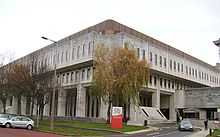

The current structure of the ministerial team is formed by Welsh Labour.
Cabinet
| Office | Name | Term | Party | Image | |
|---|---|---|---|---|---|
| First Minister | Rt. Hon Carwyn Jones AM | 2011– | Labour | 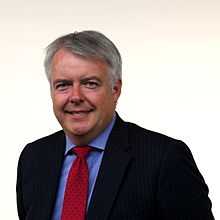 | |
| Minister for Finance & Government Business | Jane Hutt AM | 2011– | Labour | 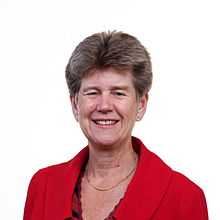 | |
| Minister for Economy, Science & Transport | Edwina Hart AM | 2011– | Labour | 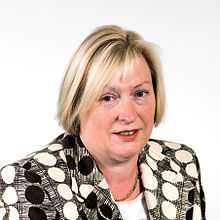 | |
| Minister for Education & Skills | Huw Lewis AM | 2013– | Labour |  | |
| Minister for Natural Resources | Carl Sargeant AM | 2011– | Labour |  | |
| Minister for Health & Social Services | Mark Drakeford AM | 2013– | Labour | 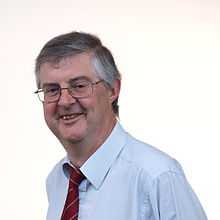 | |
| Minister for Communities and Tackling Poverty | Lesley Griffiths AM | 2013– | Labour |  | |
| Minister for Public Services | Leighton Andrews AM | 2014– | Labour | 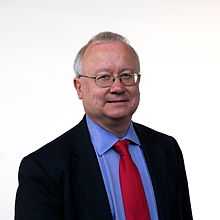 | |
| Office holders given special provisions to attend Cabinet | |||||
| Chief Whip | Janice Gregory AM | 2011– | Labour | 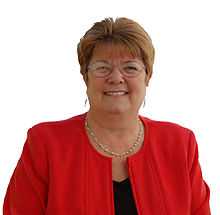 | |
| Counsel General for Wales | Theodore Huckle QC | 2011– | Labour |  | |
Deputy Ministers
| Office | Name | Term | Party | Image | |
|---|---|---|---|---|---|
| Deputy Minister for Skills and Technology | Julie James AM | 2014– | Labour |  | |
| Deputy Minister for Culture, Sport and Tourism | Ken Skates AM | 2013– | Labour |  | |
| Deputy Minister for Health | Vaughan Gething AM | 2013– | Labour |  | |
| Deputy Minister for Farming & Food | Rebecca Evans AM | 2014– | Labour |  | |
Welsh Government Home Civil Service
Permanent Secretary
The Permanent Secretary heads the Civil Service of the Welsh Government and chairs the Strategic Delivery and Performance Board.
The Permanent Secretary is a member of the Home Civil Service, and therefore takes part in the Permanent Secretaries Management Group of the UK Civil Service[6] and is answerable to the most senior civil servant in the UK, the head of the Civil Service, for his professional conduct. He remains, however, at the direction of the Welsh Ministers.
- Sir Jon Shortridge KCB (May 1999 to April 2008)
- Dame Gillian Morgan DBE (May 2008 to August 2012)
- Sir Derek Jones KCB (October 2012 to present)
Directorates
- Permanent Secretary's Department
- Office of the First Minister
- Cabinet Division
- European & External Affairs Division
- First Minister's Delivery Unit & Legislative Programme Unit
- Communications Division
- London office
- Department of Governance
- Office of the Counsel General for Wales
- Constitutional Affairs & Inter-Governmental Relations Division
- Corporate Governance & Assurance Division
- Office of the Legislative Counsel
- Office of the First Minister
- Department of Economy, Science & Transport
- Department of the Chief Scientific Adviser for Wales
- Infrastructure Division
- Strategy Division
- Sectors & Business Division
- Trade and Investment Division
- Finance and Performance Division
- Tourism, Heritage & Sport
- Department of Education & Skills
- Schools Standards and Workforce Group
- Infrastructure, Curriculum, Qualifications and Learner Support Group
- Skills, Higher Education & Lifelong Learning Group
- Welsh Language Division
- Department of Health & Social Services
- Health Policy Directorate
- Public Health Division
- Nursing Division
- Social Services & Integration Directorate
- Delivery, Finance & Performance Division
- Corporate Services & Partnerships Directorate
- Mental Health and Vulnerable Groups Division
- Substance Misuse Policy Division
- Health & Transport Directorate (NHS Reconfiguration)
- Digital Health & Care Division
- Workforce & Organisational Development Division
- Health Policy Directorate
- Department of Local Government & Communities
- Communities & Tackling Poverty Directorate
- Local Government Directorate
- Housing & Regeneration Directorate
- Department of Finance and Corporate Services
- Finance & Commercial Group
- Strategic Budgeting Division
- Financial Controls Division
- Procurement Division (Value Wales)
- Commercial & PPM Division
- National Procurement Service
- Legal Services
- HR Division
- Welsh European Funding Office (WEFO)
- Treasury
- Innovative Finance
- Financial Reform Division
- Office of the Chief Economist
- Analysis & Business Change Division
- Office of the Chief Social Research Officer
- Statistical Directorate
- Finance & Commercial Group
- Department of Natural Resources
- Environment & Sustainable Development Directorate
- Office of the Chief Veterinary Officer for Wales
- Agriculture, Food & Marine Directorate
- Planning Division
The Board
The Board translates the strategic direction set by the Welsh Cabinet and its Committees into work that is joined up across Welsh Government departments and makes the best use of its resources. The Board is made up of 6 Directors General, 2 Directors and 3 Non-executive Directors, and is chaired by the Permanent Secretary.
Board members are appointed at the discretion of and by the Permanent Secretary. Membership is not wholly dependent on functional responsibilities; it is designed to provide balanced advice and support to the Permanent Secretary, and collective leadership to the organisation as a whole.[7]
| Position | Name |
|---|---|
| Permanent Secretary | Sir Derek Jones KCB |
| Director General, Finance & Corporate Services | Michael Hearty |
| Director General, Education & Skills | Owen Evans |
| Director General, Economy, Science and Transport | James Price |
| Director General, Health & Social Services and Chief Executive of NHS Wales | Dr. Andrew Goodall |
| Director General, Local Government & Communities | Dr. June Milligan |
| Director General, Natural Resources | Gareth Jones OBE |
| Director, Legal Services | Jeff Godfrey |
| Director, Governance | David Richards |
| Non-Executive Director | Elan Closs Stephens |
| Non-Executive Director | James Turner |
| Non-Executive Director | Adrian Webb |
Welsh Government sponsored bodies
The Welsh Government is responsible for a number of Welsh Government sponsored bodies (WGSBs). These are, respectively,
- executive WGSBs, which are non-departmental public bodies such as the Arts Council of Wales;
- advisory WGSBs, which are non-departmental public bodies such as the Historic Buildings Council for Wales; and
- tribunals such as the Mental Health Review Tribunal for Wales.
WGSBs are staffed by public servants rather than civil servants.
The Welsh Government is also responsible for some public bodies that are not classed as WGSBs, such as NHS Wales, and the Welsh Offices of England and Wales legal offices.
Budget
The Welsh Government receives a budget allocation from the UK Government[8] determined by the Barnett Formula.
See also
- List of Wales-related topics
- Government spending in the United Kingdom
References
- ↑ BBC News, Wales, 13 May 2011
- ↑ "State of the Estate Report 12/13". Welsh Government. 2013-10-31. Retrieved 2013-12-31.
- ↑ Welsh Assembly Government | All offices
- ↑ Welsh Government | Update on Location Strategy
- ↑ Welsh Government | Location Strategy
- ↑ Civil Service. PSMG Membership
- ↑ Welsh Government | Membership. Wales.gov.uk (2013-03-18). Retrieved on 2013-08-24.
- ↑ Welsh Government | Budgets. Wales.gov.uk (2013-07-08). Retrieved on 2013-08-24.

